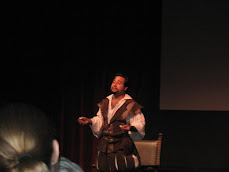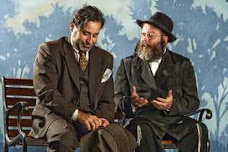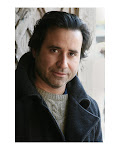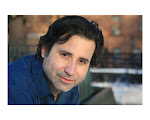by Sara Weist, Co-Editor
Daily Tar Heel
Chaz Mena, an actor from Florida, came to UNC on Nov. 17 to perform a short theatrical work about the life of José Martí.
Cuban intellectual José Martí (1853-1895) is most famous for his works of literature, his diplomatic endeavors and his role in the fight for Cuban independence from Spain. "He's like an uncle, like a member of the family, he's always there," Mena said. "You just can't get rid of him. He's always there; he's always present." Mena's presentation was in the Chatauque style, which is a dramatic attempt to represent a historical figure outside the context of a specific scene. This Chatauqua work was in the form of a conversation between the audience and the historical figure Martí. Kathy Ibarra, a UNC junior, said she liked the Chatauqua style. "It made it possible to speak with a historical figure that no one from our generation will ever be able to talk to," she said. "I am studying abroad in Cuba in the spring, so for me this was an awesome opportunity because Martí is a very important figure in Cuban culture." In the presentation, Mena spoke about the all aspects of Martí's life, both personal and political. "The Spanish say that in Cuba we are bitter," Mena said. "We are not bitter; we are dying." Mena also spoke about Martí's family life. "I was married, but my wife has since left me and returned to Cuba," he said. "But sometimes in the mornings, I feel something, and I know that what I am feeling is that my son is going to wake up." Mena is traveling throughout the country presenting his work, and he said he was especially looking forward to coming to UNC. "I was really excited about coming to UNC, more that anything because of what I had learned about Louis Pérez and the work that he is doing here," Mena said. Pérez is a history professor and director of the Latin American Studies program. His research focuses mostly on the history of the Spanish-speaking Caribbean during the 19th and 20th centuries. Pérez, who also attended the performance, said he was happy with how things had gone and he thought it is important for more people to learn about the life of José Martí. "I want everyone to read Martí's works," he said. "He is a central figure in the history of Latin America."
Tuesday, November 27, 2007
Monday, November 19, 2007
Miami Dade College Forum, “Telling a Hero’s Story Through Interactive Performance”
MONDAY, NOVEMBER 19, 2007
Author: Christopher C. Gregory-Guider
Although the celebrated Cuban Icon and writer Jose Marti died more than a century ago, actor Chaz Mena talks about him with an infectious immediacy and intimacy. “Marti was a constant subject at the dinner table when growing up, “ says Mena. “He was like a member of the family.”
With a grant from the Florida Humanities council, Mena immersed himself in Marti’s voluminous writings over the past year in preparation for a one-man theater production that will bring the fallen Cuban hero to life. In a return to the city where he spent his formative years, Mena will perform “Charla, A Chat With Jose Marti in the Chapman Conference Center on MDC’s Wolfson Campus. The performance promises to shed new light on Martí’s tireless efforts to expose injustice and his role in Cuba’s long struggle for independence.
Mena anticipates that the theme of the performance will deeply resonate with his Miami audience, but he is quick to point out that the play ultimately promotes a universal message that transcends any one ethnic group. “The message of quality Marti expressed through his life and writings is one that applies to all and one that has special meaning to Floridians,” Mena explains the connection to Florida is immediately apparent in Mena’s performance, which focuses on Marti’s trip to Ybor City in 1891 as part of his efforts to rally the region’s Cuban exiles to rise up against colonial Spain.
The play is far more than a history lesson, though. Performed in the Chautauqua style –a mode of theatre originating in fin de siecle New York—audience members will be able to interact with Mena’s character and pose questions, much as would have been the case in Marti’s actual discussions with South Florida’s late 19-century Cuban community.
Marti’s championing of the cause of the downtrodden was not without cost. He was imprisoned and deported multiple times, although Cuban officially gained independence from the U. S. in 1902, Marti was not destined to see it: He fell at the Battle of Dos Rios on May 19, 1895 after charging Spanish troops.
“Charla” A Chat With Jose Marti proves that Marti’ spirit has secured an afterlife through artists like Mena, whose performance reminds us that history is not a closed chapter of the past, but a living and breathing voice that continues to call out to us in the present.
Author: Christopher C. Gregory-Guider
Although the celebrated Cuban Icon and writer Jose Marti died more than a century ago, actor Chaz Mena talks about him with an infectious immediacy and intimacy. “Marti was a constant subject at the dinner table when growing up, “ says Mena. “He was like a member of the family.”
With a grant from the Florida Humanities council, Mena immersed himself in Marti’s voluminous writings over the past year in preparation for a one-man theater production that will bring the fallen Cuban hero to life. In a return to the city where he spent his formative years, Mena will perform “Charla, A Chat With Jose Marti in the Chapman Conference Center on MDC’s Wolfson Campus. The performance promises to shed new light on Martí’s tireless efforts to expose injustice and his role in Cuba’s long struggle for independence.
Mena anticipates that the theme of the performance will deeply resonate with his Miami audience, but he is quick to point out that the play ultimately promotes a universal message that transcends any one ethnic group. “The message of quality Marti expressed through his life and writings is one that applies to all and one that has special meaning to Floridians,” Mena explains the connection to Florida is immediately apparent in Mena’s performance, which focuses on Marti’s trip to Ybor City in 1891 as part of his efforts to rally the region’s Cuban exiles to rise up against colonial Spain.
The play is far more than a history lesson, though. Performed in the Chautauqua style –a mode of theatre originating in fin de siecle New York—audience members will be able to interact with Mena’s character and pose questions, much as would have been the case in Marti’s actual discussions with South Florida’s late 19-century Cuban community.
Marti’s championing of the cause of the downtrodden was not without cost. He was imprisoned and deported multiple times, although Cuban officially gained independence from the U. S. in 1902, Marti was not destined to see it: He fell at the Battle of Dos Rios on May 19, 1895 after charging Spanish troops.
“Charla” A Chat With Jose Marti proves that Marti’ spirit has secured an afterlife through artists like Mena, whose performance reminds us that history is not a closed chapter of the past, but a living and breathing voice that continues to call out to us in the present.
Saturday, November 10, 2007
AJT kicks up its heels with 'Fiddler'
Kerry Lengel
The Arizona Republic
Oct. 12, 2007 03:15 PM
The Arizona Republic
Oct. 12, 2007 03:15 PM
Arizona Jewish Theatre has been one of the few troupes in the Valley to consistently challenge its audience with new work. But to kick off its 20th season, the company takes a four-decade detour to revive Fiddler on the Roof.
It's a fitting choice, and not just to celebrate two decades of artistic growth. With this production, the theater also launches a partnership with Paradise Valley Community College. The school's Center for the Performing Arts is almost new (it's 2) and offers posher digs and better technical capabilities. So it makes sense to show off the new venue with a big, beautiful spectacle.
That's Fiddler, for sure. Originally produced in 1964, it held the record as Broadway's longest-running musical for nearly a decade, until Grease came along. And it's still a favorite for its rich score, which includes the lovely Sunrise, Sunset.
The Phoenix company rises to the challenge with a gorgeous set that includes foldout houses to keep the scenery constantly changing. The huge cast includes several Valley favorites, including Maria Amorocho, Ben Tyler, Patti Davis Suarez and Cathy Dresbach (as the meddling matchmaker, natch).
The talents of several up-and-comers, such as the sweet-voiced Amanda Kuchinski as one of three daughters who cast their eyes on romance not approved by the matchmaker, also are on display. (Kuchinski was last seen in a very different spectacle, Nearly Naked Theatre's Bat Boy: The Musical; expect to hear more from her.)
The best thing about this Fiddler, however, is Tevye, the hardworking mensch who struggles to uphold tradition in the face of a changing world. Good-humored in his suffering and openhearted in his devotion, this character really is the show, and actor Chaz Mena captures him perfectly.
Subscribe to:
Posts (Atom)



















